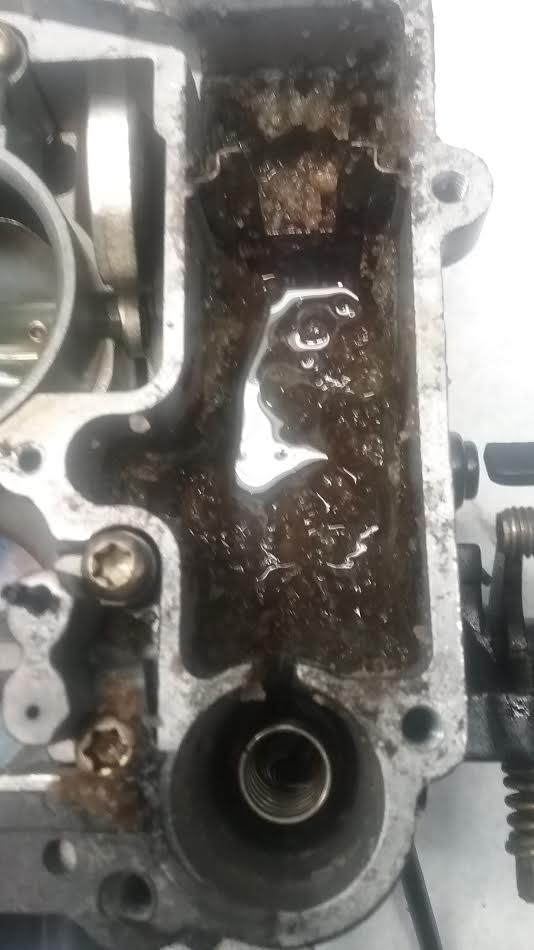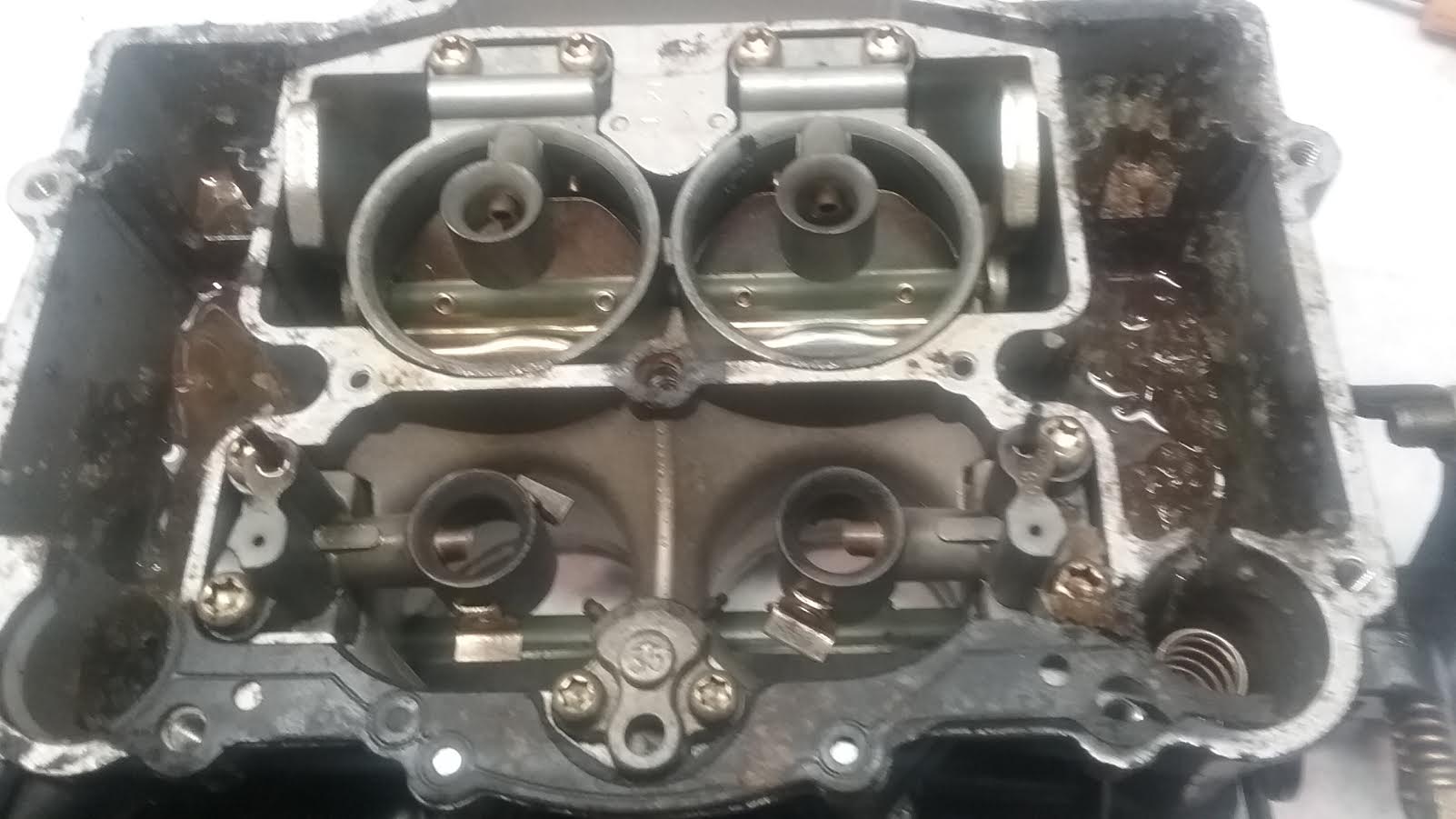Home › Forum › Ask A Member › Fuel and Lube Question
- This topic has 24 replies, 14 voices, and was last updated 8 years, 5 months ago by
outbdnut2.
-
AuthorPosts
-
June 22, 2017 at 8:43 pm #60143
I agree with Frank that ordinary pump gas seldom causes problems. The fact that plugs seldom foul these days suggests that both the oil and the gas are burning pretty cleanly.
The ethanol in the gas actually has the ability to suspend a certain amount of water. Same as the "dry gas" once sold for this purpose–it was just alcohol. The only real problem most of the time is that the ethanol content is hard on hoses, floats, tank liners, other materials. That might be a reason in some cases to use the "recreational" fuel if available.
June 22, 2017 at 9:00 pm #60146On a lot of those old motors with no gearshift, I use water-resistant white lithium wheel bearing grease meant for boat trailer bearings. I can get it in a grease-gun tube and have adapted a hose end to fittings that match threads in some old motors that allow me to pump the lower units full with the grease gun. I’m sure corn head grease will work fine too.
DaveJune 23, 2017 at 3:42 pm #60187Sent you a PM
Check you messages
at the top of the page.A "Boathouse Repair" is one thats done without having tools or the skills to do it properly.
June 24, 2017 at 11:48 am #60225I’m finding it difficult to steer clear of e-gas up here in Canada.
I have used Shell V-Power (91 octane) which is alcohol free,buts it’s expensive.
Have also had luck with regular ethanol gas spiked with "Star-Tron" additive which seems to keep the fuel fresh, even over the Winter months.
Pick your potion (not poison) I guess?June 26, 2017 at 2:13 am #60357Hay Tubs, I’m new at this, I don’t know what a PM is. I checked for messages at the top of the page but don’t know what I’m looking for. Any help with this would be greatly appreciated. I value your opinion, Thanks!
June 26, 2017 at 5:05 pm #60401Okay, I suppose I’ll chime in here because I’ve used the fuels you are referring to. Okay, mostly in airplanes, and camping stoves, but my antique motors too.
I am assuming you are making this custom mix of fuel because you are trying to get something close to non ethanol fuel. Ask your aviation friend if aviation MOGAS is available at his field. It’s ethanol free, lead free, and 93 octane.
I’ve used pure Coleman gas in my ruddertwin and other Elto singles and twins and 16:1 oil. Coleman fuel (naphtha) is what marine white gas was back in the day. 50-55 octane and no lead. You’ll enjoy easy starting and a long (almost indefinite) shelf life as the fuel is concerned. I have not experienced abnormal combustion and cylinder temps are cool. It’s expensive, sure, but I hardly consume much despite all of my motoring. I don’t think I would feel comfortable using this fuel in my own in anything made postwar.
I’ve used pure 100ll in my 15 horse Johnson for seasons now, true, I don’t need the octane or the lead, which is significant at .56 ml per gallon, almost five times the amount found in traditional (leaded) gasoline . But it does no harm, either. In time you would expect to see spark plug and valve fouling ., my outboards have no valves, nor do they run long enough to see any accumulations of lead on the plugs. I might have run 30 hours in each fishing season. You might see some if you run richer than me, or for longer. The only additive in 100ll besides the lead to the best of my knowledge is an oxygenator, something an outboarder will only need "when knucklebusters fly" . The main advantage for me is it is available, clean and ethanol free fuel.
To settle the price debate here, if it’s free, it is the cheapest fuel. If you paid for it, it’s more expensive. If you paid for it in FISH, there is no possible way you could have paid more. 😆June 27, 2017 at 2:09 pm #60463Thanks Smokeonthewater! You have given me the most direct and straight forward answer yet. I have changed my mind and have decided to continue with the 100LL gas. It has been working well so far and it cost only fish. If in the future my current source of 100LL ceases to exist I will use 91 premium but that is strictly an economic decision.
June 27, 2017 at 11:58 pm #60496quote Bill M.:Hay Tubs, I’m new at this, I don’t know what a PM is. I checked for messages at the top of the page but don’t know what I’m looking for. Any help with this would be greatly appreciated. I value your opinion, Thanks!A "Boathouse Repair" is one thats done without having tools or the skills to do it properly.
June 28, 2017 at 3:20 am #60511Anonymous
https://www.wired.com/2013/01/looney-ga … d-history/
June 28, 2017 at 11:40 am #60521I just finished up a 2 day repair on a Bayliner deck boat, that has been running on ethanol fuel. I dewinterize this boat every year, and it always fires right up, except this time. It’s a 454 V-8 with a Weber 4 BBL carb… a very dependable unit. Now this boat does set a lot, to be fair, and the owner buy’s regular ethanol blend 87 octane fuel that he carries down to the boat in 5 gallon jugs. Gas stabilizer is added each fall for storage, along with the usual fogging of the engine. Here is what I found upon opening up the carburetor…. the fuel in the tank had undergone phase seperation, and had to be completely drained out. It looked like ice tea with a layer of water. It had a horrible smell of alcohol to it. I estimate this gas to be about 1 year old. I wished I had taken some pictures of the old gas, but forgot that. The carb was almost ruined, but I was able to save it,
barely. The fuel lines also had to be cleaned and flushed. This is the worst carburetor I’ve ever seen, as it was severely corroded, especially in the fuel bowls, and in the passages. After the labor expenses, it would have been much cheaper to use GOOD gas IMHO.
I know this is not an antique outboard, but it is a carburetor, and is much the same. I don’t really want to continue the fuel debate here, but I thought I would share my findings. -
AuthorPosts
- You must be logged in to reply to this topic.




